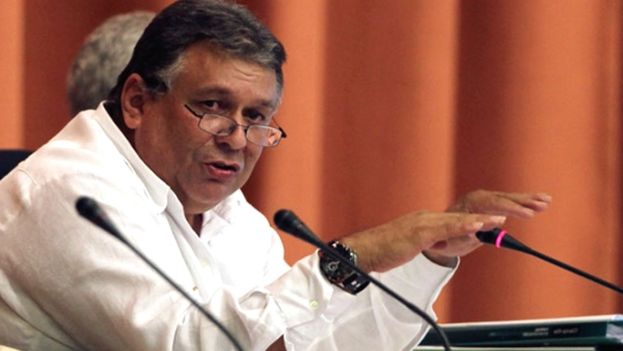
![]() 14ymedio, Reinaldo Escobar, Havana, 15 July 2016 — The ouster of Marino Murillo as head of the Ministry of Economy and Planning (MEP) raises the question of whether it was a fall into disgrace or an act of protection. An official statement said that Murillo would dedicate himself to the implementation of the Communist Party Guidelines and recognized his work as minister. The praise contrasts with the terrible results of the Cuban economy in the first half of this year and raises the question of whether Murillo’s removal, in reality, hides a promotion.
14ymedio, Reinaldo Escobar, Havana, 15 July 2016 — The ouster of Marino Murillo as head of the Ministry of Economy and Planning (MEP) raises the question of whether it was a fall into disgrace or an act of protection. An official statement said that Murillo would dedicate himself to the implementation of the Communist Party Guidelines and recognized his work as minister. The praise contrasts with the terrible results of the Cuban economy in the first half of this year and raises the question of whether Murillo’s removal, in reality, hides a promotion.
It is obvious that Cuba’s current situation is producing an important shuffling in the higher echelons of the government. The replacement of the first secretary of the Union of Young Communists, the untimely replacement of the Minister of Culture, and the departure of the head of Higher Education, have put the entire cabinet on notice at a time when even the official media speak of “the critical situation the country is experiencing.”
However, the “fall” of Murillo could also be interpreted as a strategy to distance him from blame for the disaster. What is more important: the management of the Ministry of Economy and Planning or the implementation of the Party guidelines? In the latter case, removing his ministerial portfolio would be a protective mantle placed over the former minister by Raul Castro himself. As if he wants to make people see that “if the economy is bad, it’s not Murillo’s fault.”
Why should he save Murillo? The answer to that question is in the future, at the end of 2017, when it will be made clear whose names will appear on the candidate list for the positions of president of the Councils of State and of Ministers, that Raul Castro will step down from in February of 2018, having come to the end of two consecutive terms.
If, finally, the current first vice president, Miguel Diaz Canel, replaces the General-President, the second echelon of these responsibilities would immediately become vacant. In a few more years, given the inevitable physical disappearance of the “historic generation,” a depleted quarry of cadres – lacking experience in power and also lacking prestige among the people – will have to take over in what will necessarily be a transition.
Since the high-level house cleaning that took place after Raul Castro took possession of the position of president, when Carlos Lage Davila, Felipe Perez Roque and Carlos Valenciaga, among other promising “younger sons,” were removed from their posts, the question of who will replace the current leaders has become more difficult to answer.
Sending Murillo out by the back door today, would be losing an unrecoverable card that has taken many years to develop. Compared with Jose Ramon Machado Ventura, the former Economy minister, he appears to be a reformer, a pragmatic politician who has spoken clearly about the need to produce wealth, and we have never heard him mention socialist emulation or moral encouragements as methods to boost production of material goods.
Murillo is a marked card which Raul Castro has kept up his sleeve all these years and he will not be discarded for the triviality of failing to deliver 50% growth in gross domestic product for this year. The so-called czar of reforms is the face that can give foreign investors confidence. Gone are the days when candidates for the throne had to make a show of their oratory, their imagination in creating new slogans or their histrionic capacity to show up for volunteer work.
Ricardo Cabrisas Ruiz, vice president of the Council of Ministers, has been named as a substitute for Marino Murillo in the MEP. His claim to fame is having convinced half of the world’s creditors to renegotiate the country’s foreign debt. Together they make a good match to try to save the shipwreck of a nation adrift.
If Murillo and Cabrisas are to steer the ship in one direction or another, they will have to conquer a faithless people and convince the Taliban that they are not betraying the legacy, or make them see that there is no choice but to start all over from the beginning.
